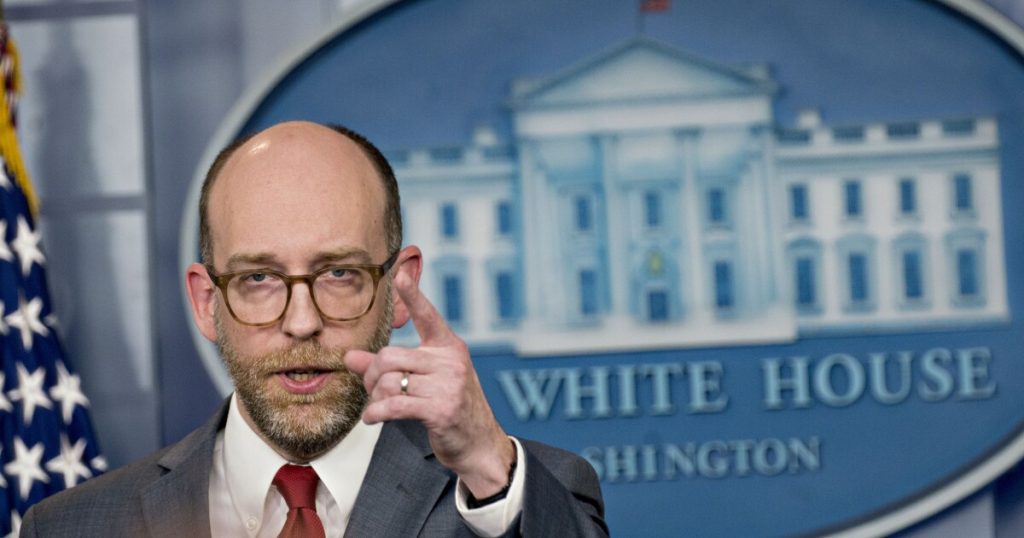Andrew Harrer/Bloomberg
The Consumer Financial Protection Bureau has withdrawn guidance from the Biden administration that had expanded states’ rights, allowing individual states to broadly enforce violations of federal consumer protection laws.
The CFPB under former CFPB Director Rohit Chopra interpreted the Consumer Financial Protection Act of 2010 broadly, and wrote an interpretive rule that allowed states to bring claims against banks and financial institutions not only under the CFPA, but also under federal laws such as the Truth in Lending Act or the Fair Credit Reporting Act.
Acting CFPB Director Russell Vought rescinded the interpretive rule last week and published his analysis
“One way to think about this is the CFPB is now telling state AGs to stick to their own state laws and not federal laws,” said Jonathan Pompan, a partner and chair of the financial services practice group at Venable LLP.
State attorneys general particularly in California, Massachusetts and New York are expected to challenge Vought’s rescission of the rule.
“States from Texas to Maine and everywhere in between have used the state enforcement provisions of the CFPA to protect their residents,” said Brad Lipton, senior fellow at the Consumer Federation of America. “Courts have already considered this issue and agreed with the CFPB’s reasoning in 2022 — and courts, not current CFPB leadership, will ultimately decide how Congress’s words should be interpreted.”
Interpretive rules are nonbinding clarifications of existing laws and are not intended to create new legal obligations or requirements. The CFPB under the Trump administration has eschewed using guidance because it does not comply with notice-and-comment rules under the Administrative Procedure Act.
Lawyers are closely watching how courts respond to the change in interpretations given that the Trump administration has flipped substantially on policy issues. For example, last week, the CFPB under Vought
In addition, the CFPB has dismissed or withdrawn more than half of its
“In light of the CFPB’s recent actions abandoning or modifying substantial settlements in Biden-era enforcement actions, it is possible that state attorneys general will no longer trust the CFPB to pursue enforcement litigation in good faith and that they will test this new rule by filing independent enforcement actions,” said Manny Newburger, a founder of the law firm Barron & Newburger in Austin, Tex.
The CFPB said the rescission of Chopra’s interpretive rule does not affect the ability of states to undertake independent enforcement, but only when the CFPB has not initiated its own action against a financial firm.
The Trump administration’s general policy at the CFPB is “to reduce regulatory and compliance burdens, and to eliminate wasteful, duplicative, and unnecessary regulatory and enforcement activity,” Vought wrote. “Interpreting section 1042 to permit states and the bureau to take parallel enforcement actions against the ‘same entity’ is out of step with this policy.”
Specifically, section 1042 of the Consumer Financial Protection Act empowers state attorneys general and other state regulators to protect consumers from “unfair, deceptive or abusive acts or practices,” known as UDAAP. Banks and financial institutions have long claimed that UDAAP violations are subjective and have the potential for inconsistent interpretations.
The rescission walks back Chopra’s 2022 interpretive rule which said states could also use section 1042 to enforce other federal consumer financial laws, an aggressive by the CFPB that was looking to deputize states into broader enforcement of federal law.
“The rescission narrows the interpretation of how broadly the Section 1042 authority can be used, not the statute itself,” Pompan said. “It certainly walks back the CFPB’s prior blessings for state enforcement through section 1042 of the CFPA.”
In the past, the CFPB relied on Chevron deference, a legal principle that dictated that federal courts should generally defer to federal agencies on the reasonable interpretations of statutes when a law’s meaning is ambiguous. Last year, the conservative Supreme Court
Before Chopra was fired by President Trump in February, he published a

